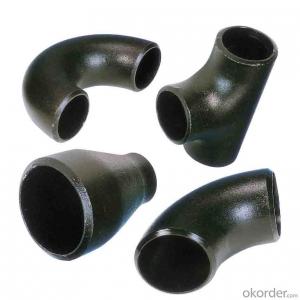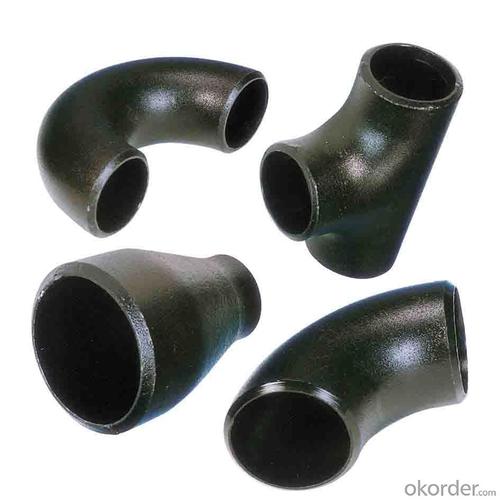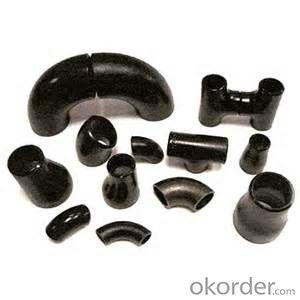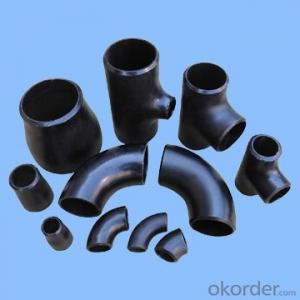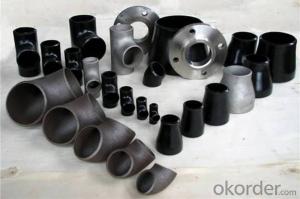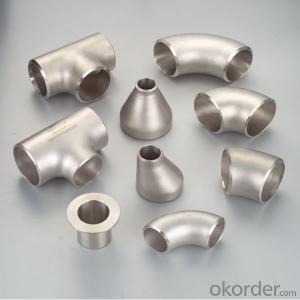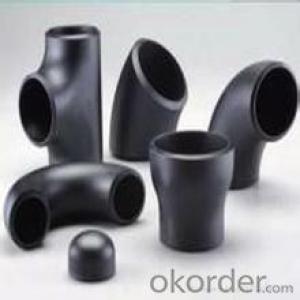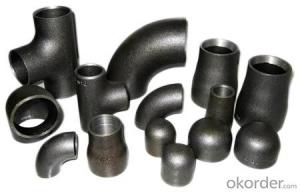12'' carbon steel pipe fittings ISO/ BS EN/DIN/ API
- Loading Port:
- Tianjin
- Payment Terms:
- TT OR LC
- Min Order Qty:
- 5 m.t
- Supply Capability:
- 300 m.t/month
OKorder Service Pledge
OKorder Financial Service
You Might Also Like
Products Detailed Description
Products | pipe fittings elbows, bends,tees, reducers caps |
Size | 1/2" - 48" |
Wall thickness | Sch5-Sch160 XXS |
Standard | ANSI, ASME API5L, OCT, DIN and JIS, etc. |
we can also produce according to drawing and standards provided by customers. | |
Material | Carbon steel, alloy steel and stainless steel. |
We can produce according to materials appointed by consumers. | |
Packaging | Plywood Cases,plywood pallet, plastic bag or as customers requirement |
Surface Treatment | Shot blasted, rust-proof black oil |
Delivery Time | 10-60 days |
Quality | First grade |
Others | 1.Special design available according to your drawing. |
2.anti-corrosion and high-temperature resistant with black painting | |
3. All the production process are made under the ISO9001:2000 strictly. | |
4. A conformity rate of ex-factory inspection of products. |
Specifications
Ansi B16.9 WPB carbon steel pipe fitting elbow tee reducer
Size:Seamless 1/2"-24" Welded 1/2"-48"
ANSI B16.9 WPB carbon steel pipe fitting elbow tee reducer
1.Size: Seamless 1/2"-24" Welded 1/2"-48"
2. WT: SGP, STD, SCH40, SCH80, SCH100,SCH120,SCH160,XS,XXS
3. Material:
stainless steel Grade: 201,304,304L,316,316L,317,317L,904L,and etc
carbon steel Grade: WPB,GRB, Q235,16MN
Alloy steel: st35.8,st52,wp11,wp22,wp12 wp l6
4. Standard: ASTM/AISI/DIN/JIS
5. Type: Concentric and eccentric
6. Surface treatment: Transparent oil, rust-proof black oil
7. Applications range: Applications range: for use in the petroleum, smelting, foodstuff, power, papermaking, chemical, medical equipment,aviation, boiler heat exchanger, and other fields
8. Packing: wooden case or as per customers' requirement
- Q: What does seamless steel tube mean? What are the main uses? What are the classifications?
- Seamless steel pipe having a hollow cross section, used as a conduit for conveying fluids, such as pipelines for transporting petroleum, natural gas, gas, water, and certain solid materials. Compared withsteel and roundsteelinsolid, flexural torsional strength in the same time, the weight is light, is a kind of economic section steel, widely used in the manufacture of structural parts and mechanical parts, such as the oil pipe, automobile transmission shaft, the bicycle frame and steel construction with scaffold with steel pipe manufacturing ring parts can be improved the utilization rate of materials, simplify the manufacturing process, material saving and working hours, has been widely used to manufacture steel tube.
- Q: Can steel pipes be used for water wells?
- Yes, steel pipes can be used for water wells. Steel pipes are commonly used in water well construction due to their durability, strength, and resistance to corrosion. They provide a reliable and long-lasting solution for extracting and transporting water from underground sources.
- Q: What is the maximum temperature that steel pipes can withstand?
- The maximum temperature that steel pipes can withstand depends on the specific grade and composition of the steel. However, generally, steel pipes can withstand temperatures up to around 1000°C (1832°F) without significant structural damage.
- Q: What is the process of spiral steel tube production?
- Butt welding: the use of advanced double submerged arc welding technology for pre welding, internal welding, external welding. The welded steel tubes are cut into standard lengths using a plasma gage.
- Q: What are the common problems or issues faced with steel pipes?
- Some common problems or issues faced with steel pipes include corrosion, leaks, blockages, and wear and tear. Corrosion can occur due to exposure to moisture or chemicals, leading to rust and weakening of the pipe. Leaks can arise from faulty connections or cracks in the pipe, resulting in water or gas leakage. Blockages can occur due to the accumulation of debris or mineral deposits, hindering the flow of fluids. Over time, steel pipes can also experience wear and tear, leading to erosion or cracks, which may require repair or replacement.
- Q: What are steel pipes made of?
- Steel pipes are primarily made of steel, which is an alloy composed of iron and carbon.
- Q: What is the difference between steel pipes and aluminum pipes?
- The main difference between steel pipes and aluminum pipes lies in their material composition. Steel pipes are made of an alloy primarily composed of iron and carbon, making them strong, durable, and resistant to corrosion. On the other hand, aluminum pipes are made of aluminum, which is a lightweight metal known for its excellent corrosion resistance and high thermal conductivity. Aluminum pipes are typically used in applications that require lightweight materials or where corrosion resistance is crucial, while steel pipes are commonly used in heavy-duty applications that require strength and durability.
- Q: What are the common methods for inspecting the integrity of steel pipes?
- To inspect the integrity of steel pipes, various methods are employed. These methods play a vital role in identifying any faults or weaknesses in the pipes that could jeopardize their structural soundness and potentially result in failures or leaks. 1. Visual Inspection: This method involves a visual examination of the external surface of the steel pipe by an inspector. The purpose is to spot any signs of damage, such as corrosion, cracks, or deformities. Although it is a quick and cost-effective approach, it may not be sufficient to detect internal defects. 2. Ultrasonic Testing (UT): UT is a non-destructive testing method that utilizes high-frequency sound waves to identify flaws in steel pipes. A transducer emits ultrasonic waves into the pipe, and any waves that bounce back are analyzed to detect defects like cracks or voids. UT is effective for inspecting both the internal and external aspects of the pipe and can provide precise measurements of defect size and location. 3. Magnetic Particle Inspection (MPI): MPI is primarily employed to detect surface or nearby surface defects in ferromagnetic materials like steel. Magnetic particles are applied to the pipe's surface, and if there is a defect, these particles will gather around it, creating a visible indication. MPI is particularly useful in identifying cracks and other discontinuities that may not be easily visible to the naked eye. 4. Radiographic Testing (RT): RT involves the use of X-rays or gamma rays to examine the internal structure of steel pipes. These rays pass through the material, and an image is recorded on a radiographic film or a digital detector. This method is effective in detecting internal defects such as cracks, voids, or inclusions. However, it necessitates proper safety measures due to the use of radiation. 5. Eddy Current Testing (ECT): ECT is a non-destructive testing method that relies on electromagnetic induction to assess the integrity of steel pipes. An alternating current is passed through a probe, generating an electromagnetic field. Any alterations in the material's electrical conductivity or magnetic permeability caused by defects are detected by the probe, providing information about the pipe's condition. These represent some of the commonly used techniques for inspecting the integrity of steel pipes. Each method possesses its own advantages and limitations, and the choice of inspection method depends on factors such as the type of defect to be identified, access to the pipe, and budgetary considerations. Regular inspection and maintenance using these methods are crucial to ensure the secure and dependable operation of steel pipe systems.
- Q: What are the different types of steel pipe coatings for offshore applications?
- There are several types of steel pipe coatings commonly used for offshore applications. These include fusion bonded epoxy (FBE) coatings, polyethylene (PE) coatings, polypropylene (PP) coatings, and three-layer polyethylene (3LPE) or polypropylene (3LPP) coatings. Each coating has its own unique properties that make it suitable for specific offshore conditions and requirements.
- Q: How are steel pipes used in transportation?
- Steel pipes are commonly used in transportation for various purposes such as the construction of pipelines for oil, gas, and water transportation. They are also used for structural support in bridges, tunnels, and railway tracks. Additionally, steel pipes are utilized in the manufacturing of vehicles, including exhaust systems, chassis, and frames, ensuring durability and reliability in transportation infrastructure.
Send your message to us
12'' carbon steel pipe fittings ISO/ BS EN/DIN/ API
- Loading Port:
- Tianjin
- Payment Terms:
- TT OR LC
- Min Order Qty:
- 5 m.t
- Supply Capability:
- 300 m.t/month
OKorder Service Pledge
OKorder Financial Service
Similar products
Hot products
Hot Searches
Related keywords
